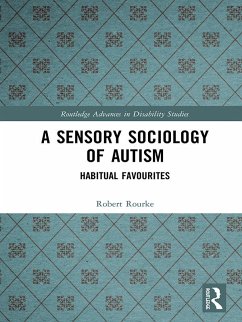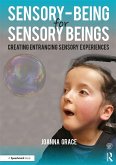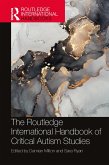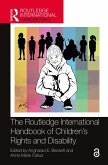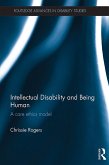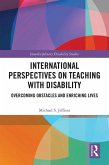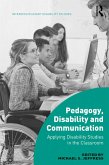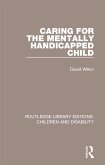42,95 €
42,95 €
inkl. MwSt.
Sofort per Download lieferbar

21 °P sammeln
42,95 €
Als Download kaufen

42,95 €
inkl. MwSt.
Sofort per Download lieferbar

21 °P sammeln
Jetzt verschenken
Alle Infos zum eBook verschenken
42,95 €
inkl. MwSt.
Sofort per Download lieferbar
Alle Infos zum eBook verschenken

21 °P sammeln
- Format: ePub
- Merkliste
- Auf die Merkliste
- Bewerten Bewerten
- Teilen
- Produkt teilen
- Produkterinnerung
- Produkterinnerung

Bitte loggen Sie sich zunächst in Ihr Kundenkonto ein oder registrieren Sie sich bei
bücher.de, um das eBook-Abo tolino select nutzen zu können.
Hier können Sie sich einloggen
Hier können Sie sich einloggen
Sie sind bereits eingeloggt. Klicken Sie auf 2. tolino select Abo, um fortzufahren.

Bitte loggen Sie sich zunächst in Ihr Kundenkonto ein oder registrieren Sie sich bei bücher.de, um das eBook-Abo tolino select nutzen zu können.
This innovative book places the sensory experiences of autistic individuals within a sociological framework. It instigates new discussions around sensory experience, autism and how disability and ability can be reconceived.
- Geräte: eReader
- mit Kopierschutz
- eBook Hilfe
- Größe: 0.83MB
Andere Kunden interessierten sich auch für
![Sensory-Being for Sensory Beings (eBook, ePUB) Sensory-Being for Sensory Beings (eBook, ePUB)]() Joanna GraceSensory-Being for Sensory Beings (eBook, ePUB)45,95 €
Joanna GraceSensory-Being for Sensory Beings (eBook, ePUB)45,95 €![The Routledge International Handbook of Critical Autism Studies (eBook, ePUB) The Routledge International Handbook of Critical Autism Studies (eBook, ePUB)]() The Routledge International Handbook of Critical Autism Studies (eBook, ePUB)46,95 €
The Routledge International Handbook of Critical Autism Studies (eBook, ePUB)46,95 €![The Routledge International Handbook of Children's Rights and Disability (eBook, ePUB) The Routledge International Handbook of Children's Rights and Disability (eBook, ePUB)]() The Routledge International Handbook of Children's Rights and Disability (eBook, ePUB)46,95 €
The Routledge International Handbook of Children's Rights and Disability (eBook, ePUB)46,95 €![Intellectual Disability and Being Human (eBook, ePUB) Intellectual Disability and Being Human (eBook, ePUB)]() Chrissie RogersIntellectual Disability and Being Human (eBook, ePUB)46,95 €
Chrissie RogersIntellectual Disability and Being Human (eBook, ePUB)46,95 €![International Perspectives on Teaching with Disability (eBook, ePUB) International Perspectives on Teaching with Disability (eBook, ePUB)]() International Perspectives on Teaching with Disability (eBook, ePUB)41,95 €
International Perspectives on Teaching with Disability (eBook, ePUB)41,95 €![Pedagogy, Disability and Communication (eBook, ePUB) Pedagogy, Disability and Communication (eBook, ePUB)]() Pedagogy, Disability and Communication (eBook, ePUB)45,95 €
Pedagogy, Disability and Communication (eBook, ePUB)45,95 €![Caring for the Mentally Handicapped Child (eBook, ePUB) Caring for the Mentally Handicapped Child (eBook, ePUB)]() David WilkinCaring for the Mentally Handicapped Child (eBook, ePUB)33,95 €
David WilkinCaring for the Mentally Handicapped Child (eBook, ePUB)33,95 €-
-
-
This innovative book places the sensory experiences of autistic individuals within a sociological framework. It instigates new discussions around sensory experience, autism and how disability and ability can be reconceived.
Dieser Download kann aus rechtlichen Gründen nur mit Rechnungsadresse in A, B, BG, CY, CZ, D, DK, EW, E, FIN, F, GR, HR, H, IRL, I, LT, L, LR, M, NL, PL, P, R, S, SLO, SK ausgeliefert werden.
Produktdetails
- Produktdetails
- Verlag: Taylor & Francis eBooks
- Seitenzahl: 182
- Erscheinungstermin: 4. März 2019
- Englisch
- ISBN-13: 9781351031486
- Artikelnr.: 56836019
- Verlag: Taylor & Francis eBooks
- Seitenzahl: 182
- Erscheinungstermin: 4. März 2019
- Englisch
- ISBN-13: 9781351031486
- Artikelnr.: 56836019
- Herstellerkennzeichnung Die Herstellerinformationen sind derzeit nicht verfügbar.
Robert Rourke is a Sociology PhD graduate who is interested in social theory, continental philosophy and disability studies. He is particularly interested in reimagining the dis/ability divide and examining how attention to autistic experience can reveal mundane power structures.
Acknowledgements
Chapter 1 - Introduction: Exploring Autism, The Senses and Autoethnography
A Sensory Beginning
Autism Spectrum Conditions - Categorisation and Expanding Definitions
Sociological Imaginations and Forming Habits
Autoethnography as Sociological Imagination
Redefining Autism Through Favourite Quasi-Objects
Notes on Research and Chapter Exercises
Conclusion - Outline of Chapters
Bibliography
Chapter 2 - Sensory Habits as Pragmatic Quasi-Object Relations
Introduction
A Brief Sociological Trajectory Of The Senses
Pragmatic Habits as Mediating Senses
Habitual Favourites as a Concept
Reassessing Sensory Sociology and Habitual Favourites With Autism
Michel Serres, The Parasite and Quasi-Objects
Habitual Favourites as Quasi-Objects - The Sensory Autistic Manifold
Conclusion
Chapter Exercises
Bibliography
Chapter 3 - Habitual Favourites: Modulated Thresholds and Quasi-Objects
Introduction - An Outline of The Chapter
Factors Impacting The Relationships to Favourites in Autism
Developing The Quasi-Object Concept
Some Comments on Using an "Events" Based Analysis
Doug - Cats, Technological Quasi-Objects and Soylent as Parasite
Garry - Multi-Modal Anxiety Relief and Social Management
Josh - Escalator Sickness
Conclusion - Reformulating Parasitical Quasi-Objects
Chapter Exercises
Bibliography
Chapter 4 - An Auto/AutieEthnography Part 1 - Methodological and Researcher Positionality
Introductory Vignette - A Multivocal Discussion of Research
Evocative Uses of Vignettes and Multivocality in Autoethnographic Accounts
A Brief Interlude - Analytic Autoethnography
An Evocative and Post-Structural Commitment to Openness
Autoethnography Concerns and Challenges
The Slippage Between Autoethnography as Narcissistic and Theory of Mind
An Emplaced Concern With Relational Ethics
Autoethnography as Journeying and Pragmatic Balance
Chapter Exercises
Bibliography
Chapter 4.5 Auto/Autieethnography Part 1.5 - Distributed Sociality and Posthuman Disability
Introduction - A Brief Interlude
Beyond Poststructural Autoethnography to Quasi-Object Relationality
PhD Work, Disability Support and Relational Ethics
How Does The Autistic Author Emerge?
Revealing the Analytic Potential in the Academic Mundane
A Concluding Multivocal Discussion
Chapter Exercises
Bibliography
Chapter 5 - An Auto/AutieEthnography Part 2 - Autoethnographic Writing Vignettes
Introduction - Of Writing Vignettes and Autoethnography
Writing Vignette 1 - Writing in Chaos - Autism, Writing and Home Care
My PhD "Writing Day" Exhilaration, Exasperation and Emotional Exhaustion
Discussion - Writing as a Mundane Academic Habitus
The Consequences of Writing in Chaos - Thinking With Care in Writing
How Do You Cope? - Future Directions
Post-PhD Update
Writing Vignette 2 - The "Glow" of Academic Labour
Back to Caring - Intellectual Structures and Identity
Conclusion - Reflecting on a Sociological Imagination
Chapter Exercises
Bibliography
Chapter 6 - Affective Atmospheres: Perturbations and Emplaced Affects
Introduction
What is An Affective Atmosphere?
What Can Be Called an Atmosphere? - Boundaries and Effects
Atmospheric Interstices - Beyond Binaries
Data Analysis - The Material/Spatial Organisation of The Club
Case 1 - Sound, KISS Radio and (Non)-Human Atmospheres
Case 2 - Echolalia, Gestural Semiosis and Blackadder
Conclusion
Chapter Exercises
Bibliography
Chapter 7 - Sensory and Disability Futures
Introduction
Habitual Favourites in Policy and Practice
Multi-Media Sensory Research
Habitual Favourites and Social Categories
The Book as Quasi-Object
Chapter Exercises
Bibliography
Index
Chapter 1 - Introduction: Exploring Autism, The Senses and Autoethnography
A Sensory Beginning
Autism Spectrum Conditions - Categorisation and Expanding Definitions
Sociological Imaginations and Forming Habits
Autoethnography as Sociological Imagination
Redefining Autism Through Favourite Quasi-Objects
Notes on Research and Chapter Exercises
Conclusion - Outline of Chapters
Bibliography
Chapter 2 - Sensory Habits as Pragmatic Quasi-Object Relations
Introduction
A Brief Sociological Trajectory Of The Senses
Pragmatic Habits as Mediating Senses
Habitual Favourites as a Concept
Reassessing Sensory Sociology and Habitual Favourites With Autism
Michel Serres, The Parasite and Quasi-Objects
Habitual Favourites as Quasi-Objects - The Sensory Autistic Manifold
Conclusion
Chapter Exercises
Bibliography
Chapter 3 - Habitual Favourites: Modulated Thresholds and Quasi-Objects
Introduction - An Outline of The Chapter
Factors Impacting The Relationships to Favourites in Autism
Developing The Quasi-Object Concept
Some Comments on Using an "Events" Based Analysis
Doug - Cats, Technological Quasi-Objects and Soylent as Parasite
Garry - Multi-Modal Anxiety Relief and Social Management
Josh - Escalator Sickness
Conclusion - Reformulating Parasitical Quasi-Objects
Chapter Exercises
Bibliography
Chapter 4 - An Auto/AutieEthnography Part 1 - Methodological and Researcher Positionality
Introductory Vignette - A Multivocal Discussion of Research
Evocative Uses of Vignettes and Multivocality in Autoethnographic Accounts
A Brief Interlude - Analytic Autoethnography
An Evocative and Post-Structural Commitment to Openness
Autoethnography Concerns and Challenges
The Slippage Between Autoethnography as Narcissistic and Theory of Mind
An Emplaced Concern With Relational Ethics
Autoethnography as Journeying and Pragmatic Balance
Chapter Exercises
Bibliography
Chapter 4.5 Auto/Autieethnography Part 1.5 - Distributed Sociality and Posthuman Disability
Introduction - A Brief Interlude
Beyond Poststructural Autoethnography to Quasi-Object Relationality
PhD Work, Disability Support and Relational Ethics
How Does The Autistic Author Emerge?
Revealing the Analytic Potential in the Academic Mundane
A Concluding Multivocal Discussion
Chapter Exercises
Bibliography
Chapter 5 - An Auto/AutieEthnography Part 2 - Autoethnographic Writing Vignettes
Introduction - Of Writing Vignettes and Autoethnography
Writing Vignette 1 - Writing in Chaos - Autism, Writing and Home Care
My PhD "Writing Day" Exhilaration, Exasperation and Emotional Exhaustion
Discussion - Writing as a Mundane Academic Habitus
The Consequences of Writing in Chaos - Thinking With Care in Writing
How Do You Cope? - Future Directions
Post-PhD Update
Writing Vignette 2 - The "Glow" of Academic Labour
Back to Caring - Intellectual Structures and Identity
Conclusion - Reflecting on a Sociological Imagination
Chapter Exercises
Bibliography
Chapter 6 - Affective Atmospheres: Perturbations and Emplaced Affects
Introduction
What is An Affective Atmosphere?
What Can Be Called an Atmosphere? - Boundaries and Effects
Atmospheric Interstices - Beyond Binaries
Data Analysis - The Material/Spatial Organisation of The Club
Case 1 - Sound, KISS Radio and (Non)-Human Atmospheres
Case 2 - Echolalia, Gestural Semiosis and Blackadder
Conclusion
Chapter Exercises
Bibliography
Chapter 7 - Sensory and Disability Futures
Introduction
Habitual Favourites in Policy and Practice
Multi-Media Sensory Research
Habitual Favourites and Social Categories
The Book as Quasi-Object
Chapter Exercises
Bibliography
Index
Acknowledgements
Chapter 1 - Introduction: Exploring Autism, The Senses and Autoethnography
A Sensory Beginning
Autism Spectrum Conditions - Categorisation and Expanding Definitions
Sociological Imaginations and Forming Habits
Autoethnography as Sociological Imagination
Redefining Autism Through Favourite Quasi-Objects
Notes on Research and Chapter Exercises
Conclusion - Outline of Chapters
Bibliography
Chapter 2 - Sensory Habits as Pragmatic Quasi-Object Relations
Introduction
A Brief Sociological Trajectory Of The Senses
Pragmatic Habits as Mediating Senses
Habitual Favourites as a Concept
Reassessing Sensory Sociology and Habitual Favourites With Autism
Michel Serres, The Parasite and Quasi-Objects
Habitual Favourites as Quasi-Objects - The Sensory Autistic Manifold
Conclusion
Chapter Exercises
Bibliography
Chapter 3 - Habitual Favourites: Modulated Thresholds and Quasi-Objects
Introduction - An Outline of The Chapter
Factors Impacting The Relationships to Favourites in Autism
Developing The Quasi-Object Concept
Some Comments on Using an "Events" Based Analysis
Doug - Cats, Technological Quasi-Objects and Soylent as Parasite
Garry - Multi-Modal Anxiety Relief and Social Management
Josh - Escalator Sickness
Conclusion - Reformulating Parasitical Quasi-Objects
Chapter Exercises
Bibliography
Chapter 4 - An Auto/AutieEthnography Part 1 - Methodological and Researcher Positionality
Introductory Vignette - A Multivocal Discussion of Research
Evocative Uses of Vignettes and Multivocality in Autoethnographic Accounts
A Brief Interlude - Analytic Autoethnography
An Evocative and Post-Structural Commitment to Openness
Autoethnography Concerns and Challenges
The Slippage Between Autoethnography as Narcissistic and Theory of Mind
An Emplaced Concern With Relational Ethics
Autoethnography as Journeying and Pragmatic Balance
Chapter Exercises
Bibliography
Chapter 4.5 Auto/Autieethnography Part 1.5 - Distributed Sociality and Posthuman Disability
Introduction - A Brief Interlude
Beyond Poststructural Autoethnography to Quasi-Object Relationality
PhD Work, Disability Support and Relational Ethics
How Does The Autistic Author Emerge?
Revealing the Analytic Potential in the Academic Mundane
A Concluding Multivocal Discussion
Chapter Exercises
Bibliography
Chapter 5 - An Auto/AutieEthnography Part 2 - Autoethnographic Writing Vignettes
Introduction - Of Writing Vignettes and Autoethnography
Writing Vignette 1 - Writing in Chaos - Autism, Writing and Home Care
My PhD "Writing Day" Exhilaration, Exasperation and Emotional Exhaustion
Discussion - Writing as a Mundane Academic Habitus
The Consequences of Writing in Chaos - Thinking With Care in Writing
How Do You Cope? - Future Directions
Post-PhD Update
Writing Vignette 2 - The "Glow" of Academic Labour
Back to Caring - Intellectual Structures and Identity
Conclusion - Reflecting on a Sociological Imagination
Chapter Exercises
Bibliography
Chapter 6 - Affective Atmospheres: Perturbations and Emplaced Affects
Introduction
What is An Affective Atmosphere?
What Can Be Called an Atmosphere? - Boundaries and Effects
Atmospheric Interstices - Beyond Binaries
Data Analysis - The Material/Spatial Organisation of The Club
Case 1 - Sound, KISS Radio and (Non)-Human Atmospheres
Case 2 - Echolalia, Gestural Semiosis and Blackadder
Conclusion
Chapter Exercises
Bibliography
Chapter 7 - Sensory and Disability Futures
Introduction
Habitual Favourites in Policy and Practice
Multi-Media Sensory Research
Habitual Favourites and Social Categories
The Book as Quasi-Object
Chapter Exercises
Bibliography
Index
Chapter 1 - Introduction: Exploring Autism, The Senses and Autoethnography
A Sensory Beginning
Autism Spectrum Conditions - Categorisation and Expanding Definitions
Sociological Imaginations and Forming Habits
Autoethnography as Sociological Imagination
Redefining Autism Through Favourite Quasi-Objects
Notes on Research and Chapter Exercises
Conclusion - Outline of Chapters
Bibliography
Chapter 2 - Sensory Habits as Pragmatic Quasi-Object Relations
Introduction
A Brief Sociological Trajectory Of The Senses
Pragmatic Habits as Mediating Senses
Habitual Favourites as a Concept
Reassessing Sensory Sociology and Habitual Favourites With Autism
Michel Serres, The Parasite and Quasi-Objects
Habitual Favourites as Quasi-Objects - The Sensory Autistic Manifold
Conclusion
Chapter Exercises
Bibliography
Chapter 3 - Habitual Favourites: Modulated Thresholds and Quasi-Objects
Introduction - An Outline of The Chapter
Factors Impacting The Relationships to Favourites in Autism
Developing The Quasi-Object Concept
Some Comments on Using an "Events" Based Analysis
Doug - Cats, Technological Quasi-Objects and Soylent as Parasite
Garry - Multi-Modal Anxiety Relief and Social Management
Josh - Escalator Sickness
Conclusion - Reformulating Parasitical Quasi-Objects
Chapter Exercises
Bibliography
Chapter 4 - An Auto/AutieEthnography Part 1 - Methodological and Researcher Positionality
Introductory Vignette - A Multivocal Discussion of Research
Evocative Uses of Vignettes and Multivocality in Autoethnographic Accounts
A Brief Interlude - Analytic Autoethnography
An Evocative and Post-Structural Commitment to Openness
Autoethnography Concerns and Challenges
The Slippage Between Autoethnography as Narcissistic and Theory of Mind
An Emplaced Concern With Relational Ethics
Autoethnography as Journeying and Pragmatic Balance
Chapter Exercises
Bibliography
Chapter 4.5 Auto/Autieethnography Part 1.5 - Distributed Sociality and Posthuman Disability
Introduction - A Brief Interlude
Beyond Poststructural Autoethnography to Quasi-Object Relationality
PhD Work, Disability Support and Relational Ethics
How Does The Autistic Author Emerge?
Revealing the Analytic Potential in the Academic Mundane
A Concluding Multivocal Discussion
Chapter Exercises
Bibliography
Chapter 5 - An Auto/AutieEthnography Part 2 - Autoethnographic Writing Vignettes
Introduction - Of Writing Vignettes and Autoethnography
Writing Vignette 1 - Writing in Chaos - Autism, Writing and Home Care
My PhD "Writing Day" Exhilaration, Exasperation and Emotional Exhaustion
Discussion - Writing as a Mundane Academic Habitus
The Consequences of Writing in Chaos - Thinking With Care in Writing
How Do You Cope? - Future Directions
Post-PhD Update
Writing Vignette 2 - The "Glow" of Academic Labour
Back to Caring - Intellectual Structures and Identity
Conclusion - Reflecting on a Sociological Imagination
Chapter Exercises
Bibliography
Chapter 6 - Affective Atmospheres: Perturbations and Emplaced Affects
Introduction
What is An Affective Atmosphere?
What Can Be Called an Atmosphere? - Boundaries and Effects
Atmospheric Interstices - Beyond Binaries
Data Analysis - The Material/Spatial Organisation of The Club
Case 1 - Sound, KISS Radio and (Non)-Human Atmospheres
Case 2 - Echolalia, Gestural Semiosis and Blackadder
Conclusion
Chapter Exercises
Bibliography
Chapter 7 - Sensory and Disability Futures
Introduction
Habitual Favourites in Policy and Practice
Multi-Media Sensory Research
Habitual Favourites and Social Categories
The Book as Quasi-Object
Chapter Exercises
Bibliography
Index
